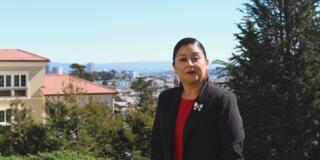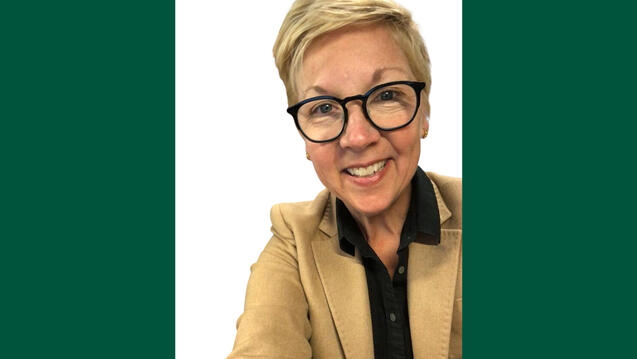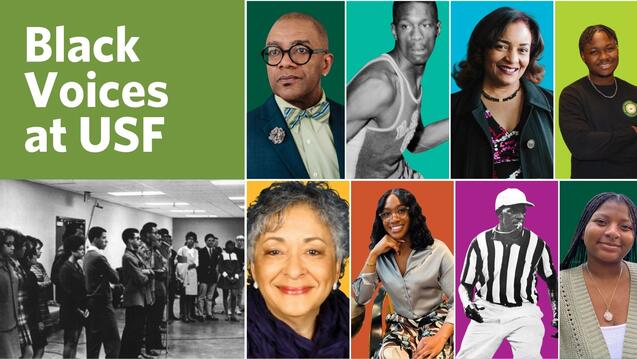Leadership is like Lombard Street

Five questions with Diana Oliva-Aroche of the Oliva-Aroche Family. This year’s recipient of the Women in Leadership & Philanthropy Heart and Soul Community Champion Award.
Why are the values of compassion, education, and social justice important to your family?
I was taught the value of compassion, education, community, and social justice at a young age. I chose the University of San Francisco based on its commitment to those Jesuit values. I’ve done this all my life — making decisions based on my values — and I continue to do so today.
Why was it important for your parents to push you and your sisters to achieve higher education? What has it taught you?
My parents are both immigrants, they crossed the border in the 1970s because there was a civil war in San Salvador. They got married in San Francisco and settled around Ocean Avenue, and decided to build a family. As the firstborn, the importance of education was instilled in me because my parents couldn't exercise the professions they earned in El Salvador. Both my parents worked 12-16 hours, sometimes seven days a week. At a young age, I understood that I needed to have an education.
I am a first-generation college student. I went to the University of California Berkeley, obtained a bachelor of arts, received a master's degree in Public Health from San Francisco State University, and am now getting my doctorate at USF. We’re all women, my siblings and I, and it was clear to us that we had to be high achievers with professions that promoted economic mobility and created social change. We weren’t going to go ahead and let their struggle go in vain. We visited El Salvador every year, so we understood. “Mija – adelante (move forward) you have no other choice. We came too far.” they’d say. They taught me the impact of grabbing hold of those lessons.
What inspired you to get your doctoral degree at USF? Why this degree and what do you hope to do with it?
There was a speech that our former president did that invigorated me. He accused El Salvador of being a “shithole country.” It was really hurtful to hear from the president of our country. I thought, “We are honorable people and contributors to this society. How could the president refer to us in that way?”
This Salvadoran woman is an educated Salvadoran woman. I looked for a doctorate that would connect me with local professionals and would help me organize agencies and organizations focused on social justice. My husband had gotten his MPA at USF, and knowing the elected officials, including our Mayor London N. Breed, I knew USF was the right choice. This school understands how to overlap social justice, feminist issues, grassroots organizing, and policy. My decision to pursue my degree at USF was about making a difference in society.
What led you to make pivots in your career? What has it been like to be a woman in some of these leadership positions in government?
My career has been fueled by my experiences; moving from community organization to violence prevention and back into criminal justice. I had the honor to serve the late Mayor Edwin M. Lee, Mayor Mark Farell, and briefly Mayor London N. Breed.
My most memorable task was leading police reform efforts and working with the San Francisco Police Department (SFPD), Police Commission, Board of Supervisors, and community stakeholders. I found a passion for working in the criminal justice system and within law enforcement.
It has been a bittersweet experience being a woman in a leadership position, specifically in law enforcement – a male-dominated field. I’ve often been the only woman in a room full of men and felt the difference in treatment.
Leadership is like Lombard Street in San Francisco, you take all these crooked turns and you want to get to the top but you don’t know how. However, you learn to become resilient by ensuring you aren’t silenced, and by caring for yourself. I always come back to my parents' teaching of Adelante, “moving forward.”
What mark are you trying to make in your career to service the San Francisco people?
When I complete my doctorate, the next step will be to write, teach, and empower others – so we can make changes in a system that often hasn’t spoken for communities of color and women.
I feel fortunate to be part of the change in the criminal justice system and to have taken part in the reform for the SFPD. If I can change one policy, so someone on the street can live a more equitable and respectful life, that’s enough for me.
Learn more about how you can get involved at Women in Leadership Philanthropy at USF


